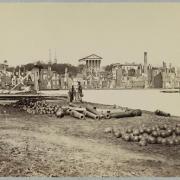5 Women Spies of the Civil War
Hundreds of women were spies on both sides of the Civil War. The book Stealing Secrets by H. Donald Winkler shares the stories of seventeen of them. Below, I'll tell you a little about five women spies every Civil War enthusiast should know.
1. Belle Boyd, spy for the Confederacy
[[{"type":"media", "view_mode":"media_large", "fid":"1145", "attributes":{"class":"media-image wp-image-2791 size-medium", "typeof":"foaf:Image", "style":"", "width":"241", "height":"300", "alt":"BelleBoyd"}}]] Belle Boyd
As a 17-year-old living with her prominent slaveholding family in West Virginia, Belle Boyd was arrested for shooting a Union soldier who had broken into her family’s home and insulted her mother. After she was cleared of all charges, she charmed intelligence from Union officers, and passed it to the Confederacy. Highly suspicious of her, Union officials sent her to live with family in Front Royal, Virginia, where she became a courier between Confederate generals Thomas J. "Stonewall" Jackson and P.G.T. Beauregard. Jackson credited the information she delivered with helping him win victories in the Shenandoah Valley Campaign of 1862. Boyd was arrested three more times throughout the war, and ended up marrying the Union naval officer who once served as her captor.
2. Pauline Cushman, spy for the Union
[[{"type":"media", "view_mode":"media_large", "fid":"1146", "attributes":{"class":"media-image wp-image-2792 size-medium", "typeof":"foaf:Image", "style":"", "width":"197", "height":"300", "alt":"Paulline Cushman"}}]] Paulline Cushman
Pauline Cushman, born in New Orleans, was a struggling 30-year-old actress in 1863. In Louisville, Kentucky, she was dared by Confederate officers to interrupt a show with a toast to the Confederacy and its president, Jefferson Davis. Seizing the opportunity, Cushman told the Union Army’s local provost marshal that the toast could be used to win trust from the Confederates in attendance. It proved to be the key that unlocked the door her most important role as a federal spy. In Nashville she worked with the Army of the Cumberland, gathering intelligence about Rebel operations, identifying Confederate spies, and acting as a federal courier. Confederates arrested her and sentenced her to hang, but the unexpected arrival of Union forces at Shelbyville saved her life.
3. Rose O'Neal Greenhow, spy for the Confederacy
[[{"type":"media", "view_mode":"media_large", "fid":"1147", "attributes":{"class":"media-image wp-image-2793 size-medium", "typeof":"foaf:Image", "style":"", "width":"286", "height":"300", "alt":"Rose Greenhow"}}]] Rose Greenhow
The widow Rose O'Neal Greenhow was a Washington socialite and zealous secessionist. She began spying for the Confederacy in 1861. One of her most important messages allegedly helped Gen. P.G.T. Beauregard gather enough forces to win the First Battle of Bull Run. Though she was placed under house arrest after that, Greenhow still managed to get information to her contacts. In January 1862, she was transferred, along with her 8-year-old daughter, to Old Capitol Prison. Several months later she was deported to Baltimore, Maryland, where the Confederates welcomed her as a hero. Confederate President Jefferson Davis sent Greenhow to Britain and France to help gain support for the Confederacy. Her journey home would be the end of her story. To quote Smithsonian.com:
In September 1864, Greenhow returned to the South aboard the Condor, a British blockade-runner, carrying $2,000 in gold. A Union gunboat pursued the ship as it neared the North Carolina shore, and it ran aground on a sandbar. Against the captain’s advice, Greenhow tried to escape in a rowboat with two other passengers. The boat capsized and she drowned, presumably weighed down by the gold she carried around her neck. Her body washed ashore the next day and was buried by the Confederates with full military honors.
4. Harriet Tubman, spy for the Union
[[{"type":"media", "view_mode":"media_large", "fid":"1148", "attributes":{"class":"media-image wp-image-2794 size-medium", "typeof":"foaf:Image", "style":"", "width":"199", "height":"300", "alt":"Harriet Tubman"}}]] Harriet Tubman
Though most known for her role spiriting slaves North to freedom, Union officers recruited her to run a spy network composed of former slaves in South Carolina. She also became the first woman in the U.S. history to lead a military expedition. She not only helped Col. James Montgomery plan a night raid to free slaves from rice plantations along the Combahee River. On June 1, 1863, Tubman was in the lead with Montgomery as they. along with hundreds of black soldiers, snaked up the river in gunboats, avoiding mines that lurked along the waterway. When they reached the shore, they destroyed a Confederate supply depot and freed more than 750 slaves.
5. Elizabeth Van Lew, spy for the Union
[[{"type":"media", "view_mode":"media_large", "fid":"1149", "attributes":{"class":"media-image wp-image-2795 size-medium", "typeof":"foaf:Image", "style":"", "width":"178", "height":"300", "alt":"Elizabeth Van Lew"}}]] Elizabeth Van Lew
Van Lew was a Richmond-born abolitionist whose sympathy for the Union, and the cause of freedom, compelled her to bring food and other comforts to the Union officers imprisoned a few blocks from her house at Libby Prison. Her loyalties were under suspicion, but her wealth and social status protected her for the most part. In December 1863, a Union officer she helped escape from Libby told General Benjamin Butler about her, suggesting she would make an excellent spy contact for the North. Butler contacted Van Lew with his request, and she agreed. She developed her own spy network, and digested and synthesized the information before sending it, encoded, via a courier to Union military officials. Van Lew's spy ring included black and white Richmonders, slave and free, native Virginians and immigrants. One of these was Mary Elizabeth Bowser, a former slave who was planted as a domestic in the White House of the Confederacy. (We talked about Mary in the post Black Spies of Confederate Richmond.) For more on Elizabeth Van Lew, I recommend Southern Lady, Yankee Spy by Elizabeth R. Varon, or this more concise Smithsonian article: "Elizabeth Van Lew: An Unlikely Union Spy". Hundreds of women, just as daring in their deeds of espionage as these spies above, have escaped fame for their work. In Spy of Richmond, I've chosen to explore the life of a young woman drawn into the spy network of Elizabeth Van Lew. The fictional heroine of Sophie Kent represents the real historical heroines who quietly gathered intelligence for the spymistress at great personal risk.
Spy of Richmond (Heroines Behind the Lines Civil War Book 4)
[[{"type":"media", "view_mode":"media_large", "fid":"1150", "attributes":{"class":"media-image alignleft size-full wp-image-2014", "typeof":"foaf:Image", "style":"", "width":"125", "height":"193", "alt":"125Spycover"}}]] Compelled to atone for the sins of her slaveholding father, Union loyalist Sophie Kent risks everything to help end the war from within the Confederate capital and abolish slavery forever. But she can’t do it alone. Former slave Bella Jamison sacrifices her freedom to come to Richmond, where her Union soldier husband is imprisoned, and her twin sister still lives in bondage in Sophie’s home. Though it may cost them their lives, they work with Sophie to betray Rebel authorities. Harrison Caldwell, a Northern journalist who escorts Bella to Richmond, infiltrates the War Department as a clerk–but is conscripted to defend the city’s fortifications. As Sophie’s spy network grows, she walks a tightrope of deception, using her father’s position as newspaper editor and a suitor’s position in the ordnance bureau for the advantage of the Union. One misstep could land her in prison, or worse. Suspicion hounds her until she barely even trusts herself. When her espionage endangers the people she loves, she makes a life-and-death gamble. Will she follow her convictions even though it costs her everything–and everyone–she holds dear? [[{"type":"media", "view_mode":"media_large", "fid":"1151", "attributes":{"class":"media-image alignnone wp-image-2768 size-full", "typeof":"foaf:Image", "style":"", "width":"134", "height":"45", "alt":"add-to-goodreads-button"}}]]


